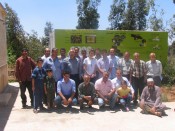|
HOBOS’ Prominent Patroness
HOBOS’ Prominent PatronessThe story of HOBOS started with a successful book entitled “The Buzz about Bees” written by Prof. Dr. Jürgen Tautz in 2008. This unique book about the superorganism (the honey bee colony) was translated into 15 languages within one year. One of these languages was Arabic. It was translated by Dr. Nizar Haddad, a scientist from the Hashemite Kingdom of Jordan. The Arabic translation of the book won a prestigious award in applied and basic sciences. The Arabic version of the book saw the light only due to the visionary leadership of Sheikh Mohammed bin Rashid Al Maktoum and his initiatives to develop the Arabic scientific library.
A group of guests visiting the Bee Research Station in northern Jordan.
The deep conviction of Prof. Tautz, his team and Dr. Haddad that it is becoming more crucial to simplify basic sciences to make them more accessible and understandable to various levels of education and from different cultures and backgrounds, led to the development of HOBOS project. This project was honoured by Her Royal Highness Princess bint Ali who agreed to be its Patroness. She is a cousin of His Majesty King Abdullah II of Jordan. HRH is an environmentalist of international renown who plays an active role as founder and president in many non-profit projects and organizations that are related to sustainable development and the environment. By doing this, she raises the public’s awareness for protecting the environment and has been granted many prizes for her deeds, e.g. the King Hussein Gold Medal for outstanding achievements. HOBOS is not just a website, it is a project that works through three components 1. Online education: HOBOS is a real-time gateway to a real honeybee colony and its environment. It gives data from within the hive and its environment including climate, soil and vegetation. Storing all of the data over a period of several years allows long-term trends of complex inter-relationships to be followed. The HOBOS website is already receiving over 300,000 visits monthly, and thousands of schools from around the world are aware of HOBOS. Some have even integrated it into their curriculum. 2. HOBOS allows for a cross-cultural approach. The HOBOS team facilitates worldwide connections between school teachers and children providing them with questions to be answered using the HOBOS online database. This database gets visits from almost 100 nations.
3. Bee gardens and exhibitions: The HOBOS group has developed an exhibition which can be used for interactive discovery of a live beehive: learning about its outstanding contribution to the ecosystem through pollination and sustainable development through the various products the bees provide. Her Royal Highness Princess Basma bint Ali works closely with us in order to integrate a Royal Bee Garden inside the Royal Botanical Garden of Jordan (www.royalb |
L&M orient 1 / 2014
Free download here: download here The Authors:Read more articles online |















